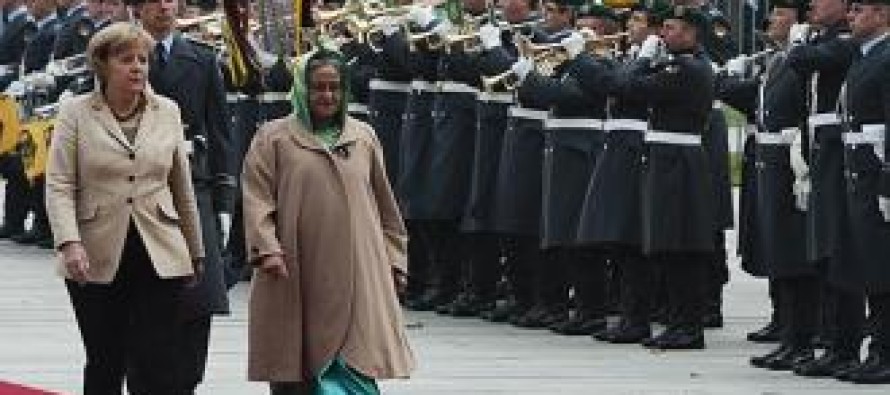Prime Minister’s visit to Germany would open greater engagement in bilateral cooperation

Prime Minister Sheikh Hasina visited Germany for five days from October 22nd. Apart from bilateral meetings with her counterpart Chancellor Angela Merkel, she addressed at the World Health Summit-2011 in which she underscored the need to make medicine affordable to all and called for forging global and regional partnership in health technology and research, capacity of building health personnel, health policy and health infrastructure.
She said further: “We can prevent millions of deaths by making vaccines affordable. Technological breakthrough thus needs to be employed to produce new generation of vaccines.”
Bilaterally the visit is significant because Germany is an economic power as well as an important member of the European Union (EU) and G-8. It is the largest economy in European Union.
The Prime Minister on October 24 spoke at a business forum “Emerging Market in Bangladesh” where potential leading German investors were present. She was accompanied by 16-member business delegation which had been able to explain the opportunities in Bangladesh to growing interest of German business leaders as trade and investment partners.
After establishment of diplomatic relations on February 4, 1972, bilateral relations between the two countries began to grow steadily both in depth and dimension. A German-Bangladeshi investment promotion and protection agreement has been in force since 1986 and a bilateral double taxation accord since 1993.
Since 1972 Germany has provided more than Euro 4.4 billion as direct bilateral assistance and indirect multilateral contributions to support Bangladesh on its way to eliminate poverty and achieve economic success. Since 1978, all German funds provided as part of government level cooperation have been in the form of non-repayable grants.
In recent times, the relationship was strengthened by a series of high-level visits by both sides. German State Secretary of the Federal Foreign Office Martin Biesel, accompanied by an eight member business delegation, visited Bangladesh on 24 November 2010 for three days, following Foreign Minister Dipu Moni’s visit in September of that year.
German Economic Cooperation Minister Dirk Niebel visited Bangladesh in June of this year and Bangladesh Commerce Minister visited Germany in the first week of October and reportedly sough German investment in the country’s apparel industry.
Germany is a reliable partner of Bangladesh in development cooperation. Since independence numerous German non-governmental organisations made tremendous efforts to promote the social and economic development of Bangladesh.
In trade with Germany, Bangladesh has for years recorded a large surplus. Germany is the second largest export market of Bangladesh after the US. During 2009-10, Bangladesh exported $2.18 billion to Germany. The overall trade volume between Germany and Bangladesh in 2010 has increased by more than 23% compared to the previous year. About 94% of the exports from Bangladesh to Germany are ready-made garments and Bangladesh imports mainly comprising machinery, chemical and electrical goods, and medicines.
With about 28 ships delivered or on order, by German ship owners, which is worth about 250 million euros or Taka 2,400 crores, it is a promising field of Bangladesh exports to Germany.
Bangladesh is a priority partner country of German Development Cooperation (GTZ). By an agreement between both the government adopted in May 2004, the activities of the GTZ focus on three priority areas, such as, healthcare including family planning, economic reform and development of the market system through promotion of private sector, especially small and medium enterprises and renewable energies.
Among the other ongoing projects the promotion of legal and social empowerment of women in Bangladesh is also to be mentioned. The sustainable economic development programme of GTZ in Bangladesh contributes to the competitiveness of the readymade garments (RMG) sector, as well as other export-oriented sectors like silk, leather and jute.
Another new dimension of German assistance is with regard to the use of renewable energies. GTZ is providing funds and assistance for up to 380,000 solar home systems and 60,000 domestic biogas plants in remote areas until 2012.
Another source of renewable energy is the development of wind power into energy and Bangladesh is blessed with a constant flow of strong south/south-westerly monsoon wind through V-shaped coastal regions from March to October. Germany may provide Bangladesh technological know-how as to how to convert wind-power into energy.
There is a century-old cultural exchange between German and Bengali people. Many Bangladeshi intellectuals take a keen and informed interest in German literature, art, architecture and philosophy. The folk music such as Baul has been very popular in Germany and a group of Baul singers was sponsored by Bangladesh Embassy sometime in 2004. There are increasing contracts amongst German and Bangladeshi artists, primarily in fine arts, photography/film and theatre. Bangladeshi artists have been able to exhibit in German galleries and museums.
The Goethe Institute in Dhaka introduced an innovative programme, called “Schools: Partners for the Future” and two schools were selected and their teachers were trained in Germany.
The bilateral economic and trade interests of both the countries are continuing, although there is considerable scope for greater engagement in which diversification of bilateral economic relationship in which full potentials of cooperation are to be realized.
Against this background, the visit of Bangladesh Prime Minister will be a milestone in bilateral cooperation in diverse fields. It is clear that both countries can and should do more together. This is an aspiration that people of both countries share for mutual benefits.
By Barrister Harun ur Rashid
Former Bangladesh Ambassador to the UN, Geneva.


